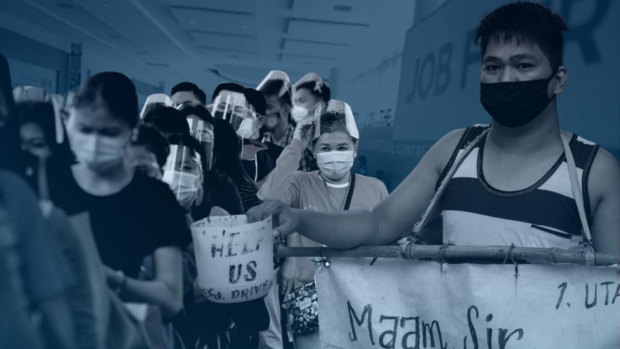Gov’t says March jobless rate near pre-pandemic low
MANILA, Philippines—Joblessness in the Philippines further declined to its lowest level during the prolonged COVID-19 pandemic last March, nearing pre-pandemic unemployment levels as more Filipinos looked for jobs amid further economic reopening.
Citing results of the latest monthly labor force survey (LFS), National Statistician Dennis Mapa on Friday (May 6) reported that the unemployment rate fell to 5.8 percent last March, the lowest since the record 17.6 percent in April 2020 when 75 percent of the economy was shut down by the most stringent lockdown at the onset of the pandemic.
Prior to April 2020, the jobless rate in January of that year was only 5.3 percent.
March’s unemployment rate translated into 2.87 million Filipinos without a job, down by about 251,000 from February and lower by around 566,000 compared with a-year-ago levels.
The number of employed Filipinos in March was 46.98 million, up by 1.5 million from February and 1.64 million a year ago.
Mapa said the labor force population — Filipinos aged 15 and above, employed or jobless, and active in the labor market — climbed to 49.85 million, higher by 1.24 million than February’s and 1.08-million more than in March 2021.
“More Filipinos joined the labor force amid increased mobility and the lower alert level. The country’s labor force participation rate continued its uptrend from 63.8 percent in February to 65.4 percent in March, which is also the highest since the pandemic began,” the state planning agency National Economic and Development Authority (Neda) said in a statement.
Mapa said the industries which posted the biggest month-on-month increases in employment last March were agriculture and forestry; administrative and support service activities; public administration, defense, and compulsory social security; manufacturing; manufacturing; as well as financial and insurance activities.
Year-on-year, more jobs were also offered in accommodation and food service activities, as well as transportation and storage, especially when many productive sectors were reopened under lower pandemic restrictions.
Neda said the lower jobless rate and higher labor force participation resulted in “significant employment creation of 1.5 million between February and March,” which it said brought net employment to 4.4 million above the level before the COVID-19 crisis struck and shed millions of jobs as well as shuttered thousands of businesses.
“The March LFS results reflect the gains from moving around 70 percent of the economy to alert level 1. As we continue to manage the risks, we reiterate our recommendation to shift the entire country to alert level 1 to generate more employment and strengthen the domestic economy against external shocks,” Socioeconomic Planning Secretary and Neda chief Karl Kendrick Chua said.
“The country has made significant progress in its recovery. As of May 1, 81 percent of the economy has shifted to alert level 1,” Chua said.
But Chua said that “the country cannot fully recover without fully resuming face-to-face classes.”
“We have already seen a significant recovery in badly hit sectors such as tourism and leisure. We need to take advantage of our progress in vaccination and mobility to fully reopen all sectors, especially face-to-face schooling. This will help secure better opportunities for future generations,” the Neda chief said.
However, the March LFS round also showed more Filipinos considered themselves underemployed or seeking longer working hours and bigger pay.
The underemployment rate rose to a four-month-high of 15.8 percent, equivalent to 7.42 million Filipinos. This meant that the quality of jobs available was unlikely keeping up with the demand.
